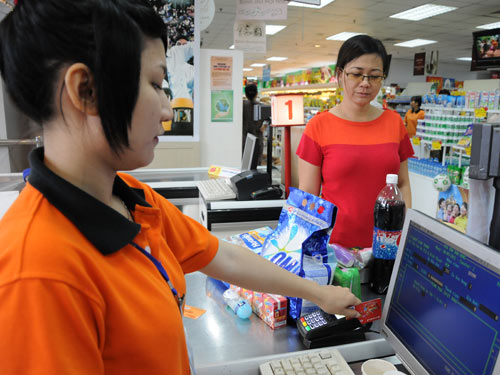Not carrying cash is not a problem in Viet Nam these days as more and more people are flashing the plastic.

Not carrying cash is not a problem in Viet Nam these days as more and more people are flashing the plastic.
Card payments are set to grow at a compound annual growth rate of 17.8 per cent to reach 522.5 million in 2023.
According to data and analytics firm GlobalData’s latest report on Viet Nam, the current 271 million card transaction in 2019 will grow to nearly double over the next three years.
The report named ‘Vietnam Cards & Payments: Opportunities and Risks to 2023,’ reveals the number of card payments increased more than five folds in the last five years, rising from 56 million in 2015 to 271 million in 2019 at a robust compound annual growth rate of 48.3 per cent.
Kartik Challa, Payments Analyst at GlobalData, said: “While Vietnam remains a cash-based society, the government’s financial inclusion initiatives, the emergence of digital-only banks, improved payment infrastructure and the adoption of new payment card technologies have led to the growth of card-based payments.”
The expansion of banking infrastructure and the licensing of non-bank companies to offer payment services in rural areas were also instrumental in driving the consumer shift towards electronic payments.
In order to reduce the reliance on cash, the government approved a scheme for the promotion of non-cash payments. As part of this, the government is aiming to bring 70 per cent of the adult population under the formal banking system by 2020.
Other objectives include the expansion of point-of-sale infrastructure and increased payments of utility bills through electronic methods.
To further boost non-cash transactions, the State Bank of Viet Nam has granted licenses to 30 non-bank companies as of July 2019 to provide payment services in the country, with most offering services through online and mobile channels.
Banks are also expanding their services to both rural and urban locations in the form of new branches, mobile van branches and digital self-service branches. Agribank now runs a fleet of more than 60 mobile banking vans across the country to serve customers primarily in remote areas.
Meanwhile, digital-only banks have also made inroads into Viet Nam during the review period, tapping into the tech-savvy millennial customer base. Digital-only bank Timo was launched in Viet Nam in 2016 while VPBank’s YOLO followed in September 2018, offering a digital account and a Mastercard debit card.
Challa added: “The government’s increasing focus on achieving a ‘less-cash’ economy, the emergence of new payment card technologies such as EMV and contactless, the advent of digital-only banks, and a strong e-commerce market will support the growth of electronic payments during the forecast period.” — VNS





